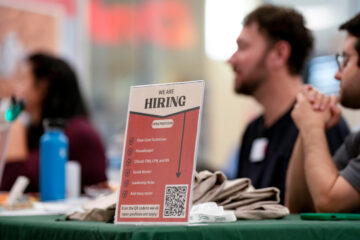Credit cards are the most popular payment method in the U.S., with convenience and reward points driving widespread use. However, they are also one of the most expensive ways to make a purchase, with most cards averaging a 22% interest rate.
Now, a U.S. district court has rolled back certain protections offered by the Consumer Financial Protection Bureau (CFPB).
💵💰Don’t miss the move: Subscribe to TheStreet’s free daily newsletter 💰💵
Higher credit card fees are on the horizon, one of many updates following the reversal of several Biden-era financial regulations. At a time when the cost of living is at an all-time high and consumer debt has reached historic levels, struggling households will be impacted the most.
However, proponents of rolling back credit card fee caps argue that it will prevent costs from being passed onto cardholders who pay bills on time.
A recent court ruling rolled back several banking and credit card regulations focused on reducing ‘junk fees’ for consumers.
Image source: Shutterstock
Credit card late payment fees no longer capped at $8
The CFPB passed several financial regulations limiting the amount of fees banks and credit card companies can charge consumers as part of the Biden administration’s effort to curtail “junk fees.”
In March 2024, the maximum credit card late fee was reduced to $8, down from an average of $32. The CFPB argued that credit card companies exploited a loophole in the 2009 Credit Card Accountability Responsibility and Disclosure (CARD) Act of 2009, charging consumers $14 billion in excess annual fees.
However, just one year later, the ruling has been reversed by a U.S. district court, effectively removing caps on late fees. The move was supported by a coalition from the U.S. Chamber of Commerce and the American Bankers Association, who note that lower late fees unfairly shift costs to cardholders who make payments on time.
More on credit cards:
Chase revokes a major privilege customers love in ‘calculated’ moveHow much credit card debt do Americans have on average?Dave Ramsey shares important advice about your credit card
At the end of 2024, U.S. household debt reached $18 trillion, with credit card debt totaling over $1 trillion. However, credit card delinquencies are on the rise, and 37% of cardholders note they made a late payment and incurred a fee last year.
As prices rise from inflation and looming trade wars, more Americans may be impacted by unforgiving credit card late fees.
The fate of CFPB remains up in the air in the wake of regulatory rollbacks
The Trump administration has recently committed to reversing regulations that are deemed unfriendly to business, making the future role of the CFPB unclear.
Though a federal appeals court ruled on April 12 that the Trump administration can reduce the size of the CFPB, it cannot dismantle the organization or prevent it from performing its established duties.
Related: Here’s the average American’s credit score — and the key to improving yours
Still, as regulations and protections are repealed, consumers will likely see a rise in fees from their credit card issuers and banks.
Last week, the Trump Administration reversed another CFPB rule, this time aimed at overdraft fees. The CFPB passed a final bank fee rule at the end of 2024, saving Americans who incur overdraft fees over $5 billion —or $225 per household— per year.
Millions of Americans, particularly those living paycheck to paycheck and relying on credit cards to get by, will be subject to higher fees going forward.
Related: Veteran fund manager unveils eye-popping S&P 500 forecast


